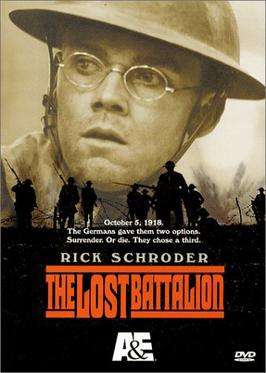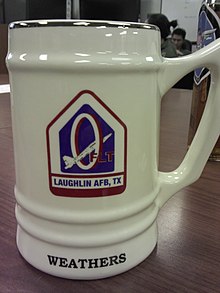The Lost Battalion (2001 film)
The Lost Battalion is a true 2001 made-for-television war drama film about the Lost Battalion of World War I, which was cut off and surrounded by German forces in the Argonne Forest during the Meuse-Argonne Offensive of 1918. Later the Versailles treaty put an end to the Great War. The film was directed by Russell Mulcahy, written by James Carabatsos, and starred Rick Schroder as Major Charles Whittlesey. The film was shot in Luxembourg. It is an A&E Original Movie, premiering on the network in 2001. It is also played on A&E's sister networks such as The History Channel. It was released on home video in January 2002.
| The Lost Battalion | |
|---|---|
 | |
| Written by | James Carabatsos |
| Directed by | Russell Mulcahy |
| Starring | Rick Schroder Michael Brandon |
| Music by | Richard Marvin |
| Country of origin | United States |
| Original language(s) | English German |
| Production | |
| Executive producer(s) | David Gerber Michael Weisbarth |
| Producer(s) | Tom Reeve Romain Schroeder |
| Cinematography | Jonathan Freeman |
| Editor(s) | William Stitch |
| Running time | 92 minutes |
| Production company(s) | A&E Television Networks David Gerber Productions 20th Century Fox Television |
| Release | |
| Original network | A&E |
| Original release | December 2, 2001 |
Characters
Colonel Evan M. Johnson was the 154th Infantry Brigade Commander and loyally served General Robert Alexander. At the first mention of General Alexander’s orders for Major Wittlesey, Colonel Johnson did not question the General’s motives. However, once Colonel Johnson became aware of the growing amount of casualties suffered by Major Whittlesey’s men, he grew more sympathetic about the safety of the 308th. As a result, he audaciously approached General Alexander and proposed that Major Wittlesey should withdraw and regroup. Colonel Johnson’s loyalty for General Alexander shifted once he realized Major Wittlesey wasn’t supported on is flank as promised.

Captain George McMurtry was the 308th Infantry Commander. He was an experienced military man and demonstrated a transformational leadership style. Captain McMurtry respected his men in much of the same way that he respected Major Wittlesey. Aligning with the transformational leadership style, he recognized the potential leadership qualities in Lt Leak and Private Lipasti, and provided guidance for how they could each excel in their assigned responsibilities. During each battle, he encouraged his men and did his best to keep them safe. When he became injured, he continued to maintain a positive attitude. If he doubted the 308th efforts, he was not afraid to confide in Major Wittlesey because he knew they could effectively communicate.
Captain Nelson Holderman was the 307th Infantry Company K Commander. He bravely led the 307th and made his first presence as he was cautiously trying to carry his men out of the German’s reach as he anticipated an attack from behind. As he ironically “runs into” Private Lipasti from the 308th battalion, he is persuaded and influenced by Private Lipasti’s insight on the German’s location as to where the 307th should not go. Therefore, he allows Private Lipasti to lead the 307th back to the Mill and join up with the 308th. Once he arrives, he is graciously welcomed by Major Whittlesey after assisting with repelling another German attack.
Lt. James V. Leak was the 308th Platoon Commander. He showed two different sides to his character as he was introduced to Captain McMurtry and to Major Whittlesey. When he first met Captain McMurtry he seemed overconfident stating he was meant to be with men from Texas, since that is where he was from. Lt. Leak was later introduced to Major Wittlesey and seemed to have a break in his confidence and appeared more insecure as Major Whittlesey squared him away with what to expect at the 308th and gave him his first orders. After being taken under the wing of Captain McMurtry, his character developed, and with determination, he courageously led his men through battle. On behalf of the 308th, he displayed strength and resiliency, during his time in German captivity, and refused the offer from the German officer to surrender.
Cast
- Rick Schroder - Maj. Charles W. Whittlesey
- Phil McKee - Capt. George G. McMurtry
- Jamie Harris - Sgt. Gaedeke
- Jay Rodan - Lt. James V. Leak
- Adam James - Capt. Nelson M. Holderman
- Daniel Caltagirone - Pvt. Philip Cepaglia
- Michael Goldstrom - Pvt. Jacob Rosen
- André Vippolis - Pvt. Frank Lipasti
- Rhys Miles Thomas - Pvt. Bob Yoder
- Arthur Kremer - Pvt. Abraham Krotoshinsky
- Adam Kotz - Col. Johnson
- Justin Scot - Pvt. Omer Richards
- Anthony Azizi - Pvt. Nat Henchman
- George Calil - Pvt. Lowell R. Hollingshead
- Wolf Kahler - Major General (Generalmajor) Freidrich Wilhelm Von Sybel
- Joachim Paul Assböck - Maj. Fritz Heinrich Prinz
- Michael Brandon - Maj. Gen. Robert Alexander
Reception
The film has received generally positive reviews, praised for its historical accuracy, cast, and intense action. Military.com wrote, "The script is compelling on several levels. Whittlesey, the bookish-looking New York lawyer turned soldier, is the Everyman Warrior that viewers enjoy identifying with. Most would like to think that placed in a similar situation they too would find the courage to act as Whittlesey did. Moreover, the movie offers another take on the classic theme that pits an intrepid underdog David against the prohibitive favorite Goliath. As with the Biblical David — but not with Col. Davy Crockett at the Alamo and Custer at Little Bighorn — the underdog prevails here".[1]
BeyondHollywood.com praised the visuals and cinematography for creating a war movie suitable for television without compromising on intensity and action. "The problem with many war films is that after the gore and bloodletting of Saving Private Ryan any war movie looks like an exercise in G-rated filmmaking. The Lost Battalion gets around this problematic obstacle in two ways — it is based entirely on a true story and Jonathan Freeman blesses it with excellent cinematography...The movie is frenetic, chaotic, and completely breathtaking to look at."[2] The review continued, "The Lost Battalion is filled with brutal and personal action that makes you feel like you're there as the men struggle to survive. The movie has immediacy and a sense of claustrophobia as the enemy appears a few dozen yards in front of you, so close that you can see their eyes from your separate positions. The trench warfare aspect of World War I comes alive in bloody color and pale brown dirt."[2]
Awards
The film was nominated for three 2002 Emmy Awards: Outstanding Single Camera Picture Editing; Outstanding Single Camera Sound Mixing; and Outstanding Sound Editing.[3] It won the Motion Picture Sound Editors award for Best Sound Editing in Television (Effects).[3] It won the Christopher Award.[3] It was nominated for the American Cinema Editors award for Best Edited Motion Picture for Commercial Television.[3]